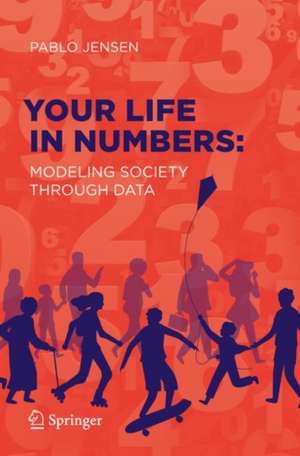Your Life in Numbers: Modeling Society Through Data
Autor Pablo Jensenen Limba Engleză Paperback – 4 mai 2021
With a rare background in physics, economics and sociology, the author is able to present an insider’s view of the strengths, weaknesses and dangers of transforming our lives into numbers. After reading this book, you’ll understand how different numerical models work and how they are used in practice. The author begins by exploring several simple, easy-to-understand models that form the basis for more complex simulations. What follows is an exploration of the myriad ways that models have come to describe and define our world, from epidemiology and climate change to urban planning and the world chess championship.
Highly engaging and nontechnical, this book will appeal to any readers interested in understanding the links between data and society and how our lives are being increasingly captured in numbers.
Preț: 171.36 lei
Nou
Puncte Express: 257
Preț estimativ în valută:
32.79€ • 34.11$ • 27.07£
32.79€ • 34.11$ • 27.07£
Carte tipărită la comandă
Livrare economică 11-17 aprilie
Preluare comenzi: 021 569.72.76
Specificații
ISBN-13: 9783030651022
ISBN-10: 3030651029
Pagini: 114
Ilustrații: VII, 114 p. 16 illus., 10 illus. in color.
Dimensiuni: 155 x 235 mm
Greutate: 0.18 kg
Ediția:1st ed. 2021
Editura: Springer International Publishing
Colecția Copernicus
Locul publicării:Cham, Switzerland
ISBN-10: 3030651029
Pagini: 114
Ilustrații: VII, 114 p. 16 illus., 10 illus. in color.
Dimensiuni: 155 x 235 mm
Greutate: 0.18 kg
Ediția:1st ed. 2021
Editura: Springer International Publishing
Colecția Copernicus
Locul publicării:Cham, Switzerland
Cuprins
Introduction.- Three Simple Models.- What can be Learnt from Simple Models?.- Reality Check for Simple Models.- A Physical Simple Model.- What are Simple Models Worth for?.- Complex Models to Understand Complex Social Situations.- Modelling Epidemics.- Why Weather/Climate Forecasts can be Trusted.- We are not Social Atoms.- Social Data are Soaked by Social Complexity.- Machines that Learn How to Model.- Starting from Data to Hunt Causes.- A Moral Thermometer?.- Where do Indicators Lead us?. Which Numbers for the Future?.- Conclusion.- Acknowledgements.- Annexes.
Recenzii
“Your Life in Numbers is an outcome of deep investigations into the concepts of modeling, their impact on society, and their role in decision making. … This brief treatise is worth the reader’s time and effort. It is quite revealing and demystifying.” (Firdous Ahmad Mala, The Mathematical Intelligencer, Vol. 45 (3), September, 2023)
Notă biografică
Pablo Jensen is a physicist at Ecole Normale Supérieure and former director of the Complex Systems Institute in Lyon. He founded the French scientific cafés in 1997 and authored "Atoms in My Cappucino ?! Can physics explain everything?" (in French, Seuil, 2001, more than 11000 copies sold so far). He has published a hundred articles in international journals in physics, economics and sociology. Presently, he works with social scientists to create formal tools that enrich our understanding of society.
Textul de pe ultima copertă
More than 300 years ago, Isaac Newton created a mathematical model of the solar system that predicted the existence of a yet unknown planet: Neptune. Today, driven by the digital revolution, modern scientists are creating complex models of society itself to shed light on topics as far-ranging as epidemic outbreaks and economic growth. But how do these scientists gather and interpret their data? How accurate are their models? Can we trust the numbers?
With a rare background in physics, economics and sociology, the author is able to present an insider’s view of the strengths, weaknesses and dangers of transforming our lives into numbers. After reading this book, you’ll understand how different numerical models work and how they are used in practice. The author begins by exploring several simple, easy-to-understand models that form the basis for more complex simulations. What follows is an exploration of the myriad ways that models have come to describe and define our world, from epidemiology and climate change to urban planning and the world chess championship.
Highly engaging and nontechnical, this book will appeal to any readers interested in understanding the links between data and society and how our lives are being increasingly captured in numbers.
With a rare background in physics, economics and sociology, the author is able to present an insider’s view of the strengths, weaknesses and dangers of transforming our lives into numbers. After reading this book, you’ll understand how different numerical models work and how they are used in practice. The author begins by exploring several simple, easy-to-understand models that form the basis for more complex simulations. What follows is an exploration of the myriad ways that models have come to describe and define our world, from epidemiology and climate change to urban planning and the world chess championship.
Highly engaging and nontechnical, this book will appeal to any readers interested in understanding the links between data and society and how our lives are being increasingly captured in numbers.
Caracteristici
Readable for a wide audience Unique combination from social and natural sciences points of view Deals with the important political and philosophical questions raised by this new field
